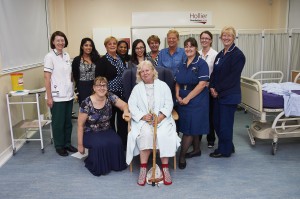 Patients with an ‘under recognised’ condition and their loved ones are benefiting from better care thanks to an innovative new training course at Good Hope Hospital.
Patients with an ‘under recognised’ condition and their loved ones are benefiting from better care thanks to an innovative new training course at Good Hope Hospital.
Delirium is a condition of acute confusion and rapid changes in brain function, including attention disruption, disorganised thinking, disorientation and changes in sensation. It is most prevalent in the elderly and can be caused by a wide range of physical problems and can also be caused, or associated with conditions such as dementia, anxiety and depression.
To help tackle the condition in hospital elderly care consultant at Good Hope Dr Helen Chamberlain has led on providing training to staff across all specialities on how to deal with patients who suffer from delirium.
She said: “Delirium is under-recognised and often badly managed and increases the chance of poor outcomes for patients. However if we can manage it properly the outcomes can be considerably better for patients.
“This is a multi-professional training course that is not restricted to one speciality. You cannot manage delirium on your own – you need a team of people with multiple skills. The training has proved very popular with the staff and from our evaluations we have found that non-medics and more junior grade staff who have prolonged contact with these patients are getting the most benefit which shows there is a huge educational need there.
“As a result of the training students are getting more confident with communication and managing agitated patients. They are also learning how to manage the expectations of relatives and how they are coping with their loved ones having delirium.”
The training uses simulated clinical scenarios that allows participants to practice skills in managing patients with delirium. The inter-professional environment in which the course is held allows staff to learn from each other’s skills
One of the staff members taking part in the course, therapist support worker Stephanie Baker, said she found the training extremely interesting and explained what she had learned from the experience.
She said: “It has been really interesting and a real eye opener. I have learned how to deal with a patient who has delirium and to notice the signs that patient may be suffering with the condition, as well as the different assessments you need to do and how to calm a patient down with delirium. I have also learned how to notice the differences between a patient with delirium and one who has dementia.
“Some of the scenarios we were put in as part of the training were really eye-opening and actually quite traumatic but it was a great experience and I feel it has given me the tools to be able to deal effectively with a patient with delirium.”
Training such as this is a major focus of an overall dementia and delirium strategy currently being delivered across Heart of England NHS Foundation Trust hospitals.






